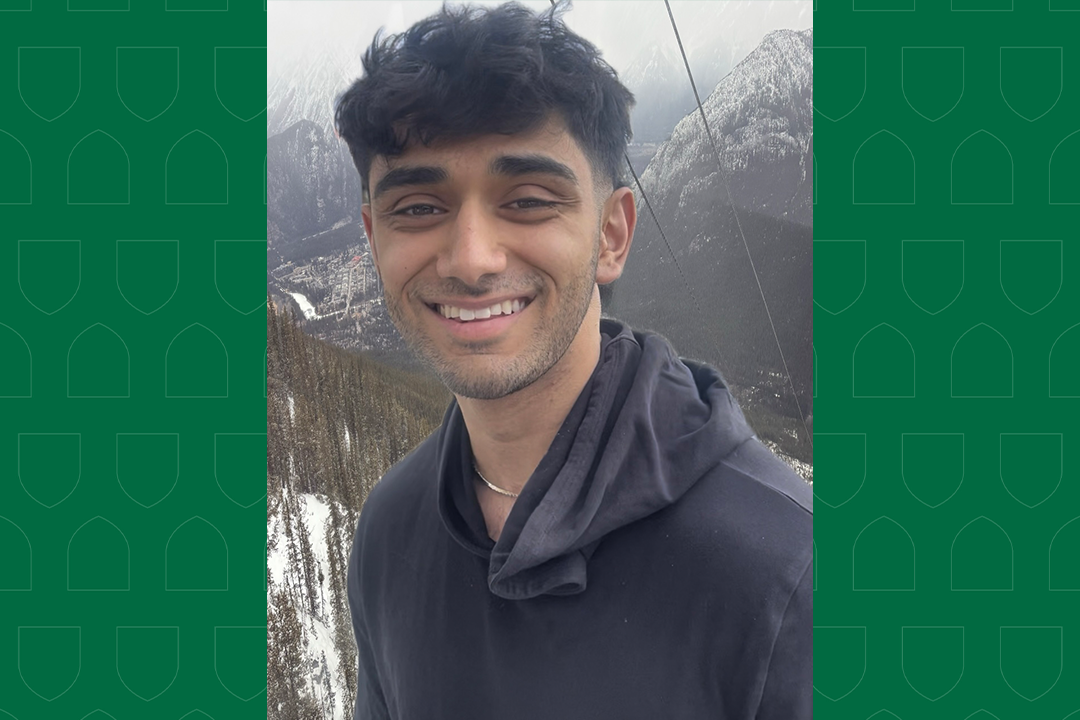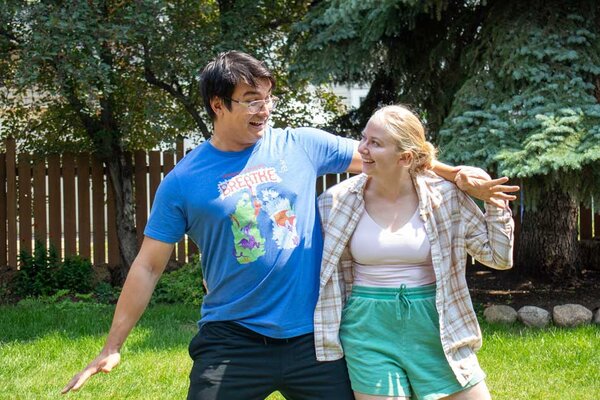
Most distinguished USask social sciences graduate emphasizes the ‘importance of balance’
Psychology student to receive Copland Prize in Social Sciences at USask Spring Convocation
By Kristen McEwen
As University of Saskatchewan (USask) psychology student Vinesh Rao scrolled through his email, he was surprised to learn he will be graduating with a significant award.
“Looking at that (notification)—not only was it incredible to see that I was recognized for my achievement academically, but it felt like a culmination of these past few years of struggling when it came to school and pushing through,” he said.
Rao will be graduating at the USask Spring Convocation with a Bachelor of Arts Four-Year Degree with great distinction in psychology. He will also be receiving the Copland Prize in Social Science from the college.
The Copland Prize in Social Science is awarded annually at each Spring Convocation to the most distinguished graduate in the social sciences. The prize was donated in memory of the late Thomas Copland, by his wife, Mrs. Copland.
“It’s fulfilling and I couldn’t be more grateful,” he said. “I feel a little bit of imposter syndrome—I think that there’s certainly other people who I feel must have worked harder, but I know for a fact that I did work very hard for this accomplishment.”
Though he’s graduating with a four-year degree from the USask College of Arts and Science, Rao noted he completed his third year of university.
When attending high school in his hometown of Edmonton, Alta., he had the opportunity to take AP (advanced placement) classes. This allowed him to take upper-level courses in his first year at USask.
Rao decided to attend USask with encouragement from his parents. They fell in love with Saskatchewan after visiting Saskatoon a couple of times, Rao explained.
“(They liked) the environment itself. In regard to the people—how tightly knit everyone seemed to be, and also the campus,” he said.
Rao attended USask alongside his brother, who was one year further in his degree. “We have absolutely zero regrets regarding that. I think it was the best decision, academically, that I’ve ever made.”
Going to university with his brother made going to school in a different city a bit easier, he said.
“Some of my friends came to Saskatchewan on their own, and it was incredibly challenging for them not having many social supports. But despite the fact that (my brother and I) ... knew literally zero people in Saskatchewan, we could always rely on each other.”
Though he didn’t know many people, Rao tried to leave his comfort zone as often as possible.
“Whether that be in the courses, talking to the person next to me, or in the library ... It was never in my mind that they would be beneficial for me academically. But I think just being kind to people and helping others out ultimately had a very positive impact on my brother and myself,” he said.
“Frankly, I don’t think I would be where I am today, if it weren’t for those connections that we developed over time,” he added.
Making connections with other people is what inspired Rao to decide to major in psychology. In his first year of classes, he struck up a conversation with upper-year psychology students. The conversation led him to seriously consider the subject area.
“When it comes to making connections, I like to say, university—a huge component of it at least—is not necessarily about what you know, but who you know, right? People who can give you advice regarding certain courses, regarding certain steps you can take—maybe if you’re considering a professional college down the line.”
While he enjoyed his classes, Rao also made time to explore opportunities outside of his classes. He became a research assistant at the BrAIn Lab (Brain in Action and Interaction Lab) led by USask psychology professor Dr. Janeen Loehr (PhD).
“I learned how much Dr. Loehr works with music and the different components of interpersonal coordination and understanding what’s going on in our minds as people are completing activities with one another. I found that super cool,” he said.
After graduation, Rao will be attending medical school at the University of British Columbia in the fall.
The biggest lesson Rao learned throughout his time at USask was the need for balance. While completing his degree in three years was a benefit academically, there were aspects where Rao wished he could have spent more time outside of his studies.
“I love music,” he said. “Even now, I’ll play the piano in my spare time as a means of relaxation. And I’ll try to continue to do now that I have more time.”
He added that he plans to set time aside to read, to learn and absorb knowledge about things he’s interested in.
“We’re in a world where we have access to so much through social media, but we have these algorithms that keep us locked in a place where we don’t really grow,” he said. “So I’m trying to break out of that and utilize what we have to my own advantage.”
For students planning on entering post-secondary, Rao emphasized the importance of balance.
“The one thing that could have made things even better was allowing myself more time to rest, and if anything, that could have actually increased some of my success in academia,” he said.
“When you push yourself super, super hard, and you’re so hyper-focused on one goal can actually be a little bit of a disadvantage. Spend time with friends to unwind and take time for yourself—I’ve learned that can actually increase your motivation and give you some time to reflect on your goals and do things in a much more strategic manner.”


